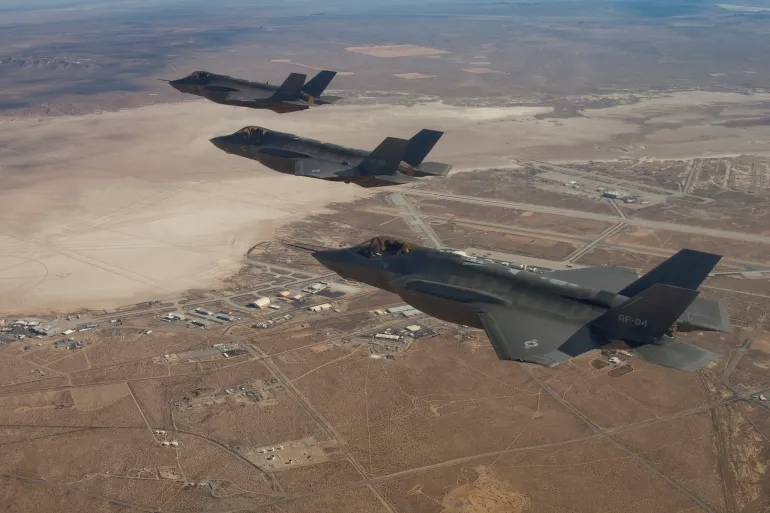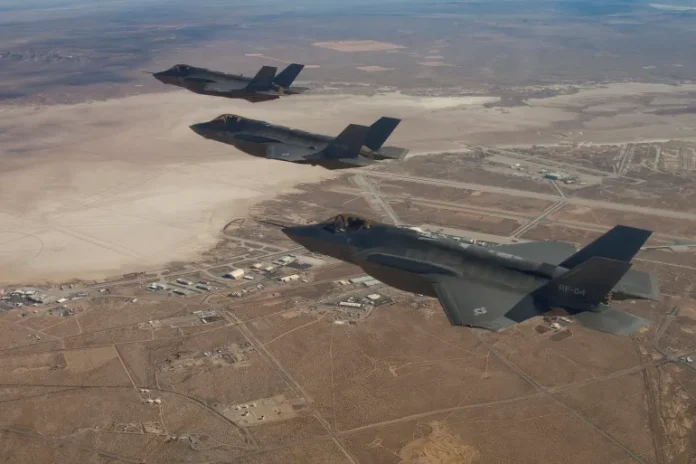The United States has deployed a squadron of F-35 stealth fighter jets to Puerto Rico amid reports that President Donald Trump is actively considering
The United States has deployed a squadron of F-35 stealth fighter jets to Puerto Rico amid reports that President Donald Trump is actively considering targeted military strikes against drug cartels operating inside Venezuela.
At least ten F-35s, among the most advanced warplanes in the world, are reportedly part of an expanded U.S. counter-narcotics mission targeting what the administration calls “narco-terrorist organizations” throughout Latin America.
According to U.S. defense officials speaking to major media outlets, the Trump administration is weighing direct strikes on cartel networks inside Venezuelan territory—a move that would dramatically escalate tensions with the embattled government of President Nicolás Maduro.
Maduro Responds with Mobilization
In a defiant response, President Maduro warned that any attack on Venezuelan soil would spark an “armed struggle.” He announced the mobilization of 340,000 active troops and claimed the support of millions of reservists and civilian militia.
“We urge Washington to abandon its plan of violent regime change,” Maduro said in a televised address, accusing the U.S. of using cartel operations as a pretext for intervention.
Trump, for his part, denied that the objective was regime change, but questioned the legitimacy of Maduro’s 2018 re-election, calling it “a sham.”
Massive U.S. Military Presence in the Region
The F-35 deployment coincides with a significant U.S. naval build-up in the southern Caribbean, including:
- At least seven U.S. Navy warships,
- A nuclear-powered submarine, and
- Thousands of Marines stationed within striking distance of Venezuela’s coast.
On Thursday, tensions escalated further when two Venezuelan F-16 fighter jets reportedly conducted a close flyover of the USS Jason Dunham, a U.S. Navy guided-missile destroyer. The Pentagon condemned the maneuver as “highly provocative,” and Trump warned that U.S. forces were authorized to “shoot down any aircraft posing a threat.”
Airstrike on Alleged Cartel Boat
The deployment follows a U.S. strike earlier this week on a speedboat in the Caribbean, allegedly operated by the notorious Tren de Aragua cartel. Trump claimed 11 suspected narco-traffickers were killed, calling the strike a “warning shot” to criminal groups in the region.
Venezuela’s government condemned the operation as an “extrajudicial killing” and a violation of international law.
Rubio: “What Stops Them Is When You Blow Them Up”
U.S. Secretary of State Marco Rubio, a key architect of Washington’s hardline Latin America policy, defended the aggressive strategy.
“These cartels aren’t scared of diplomacy. What will stop them is when you blow them up,” Rubio said during a visit to Mexico City.
The remarks drew sharp reactions across Latin America, with critics warning that military escalation could ignite a broader regional conflict.
What’s Next?
With the deployment of next-gen fighter jets, warships, and elite U.S. forces, the situation in the Caribbean is reaching a boiling point. While Washington insists its mission is narrowly focused on cartel disruption, any strike on Venezuelan soil—intentional or otherwise—could trigger a full-blown geopolitical crisis.


